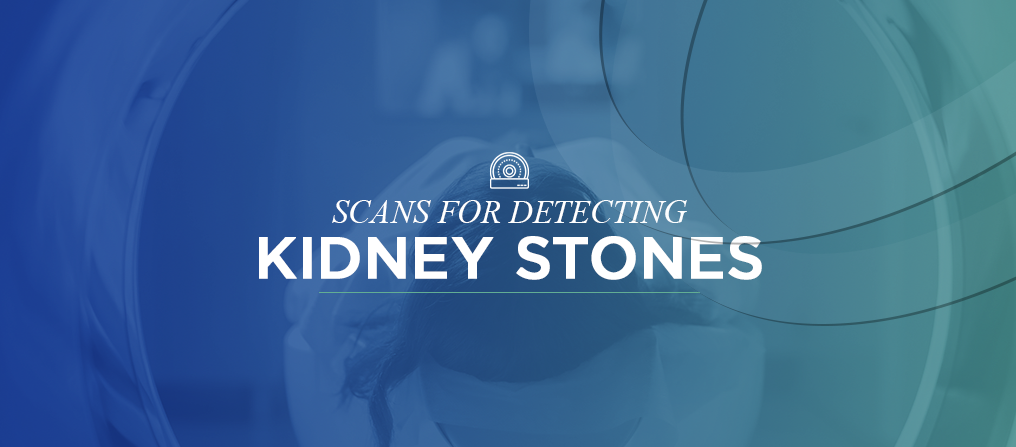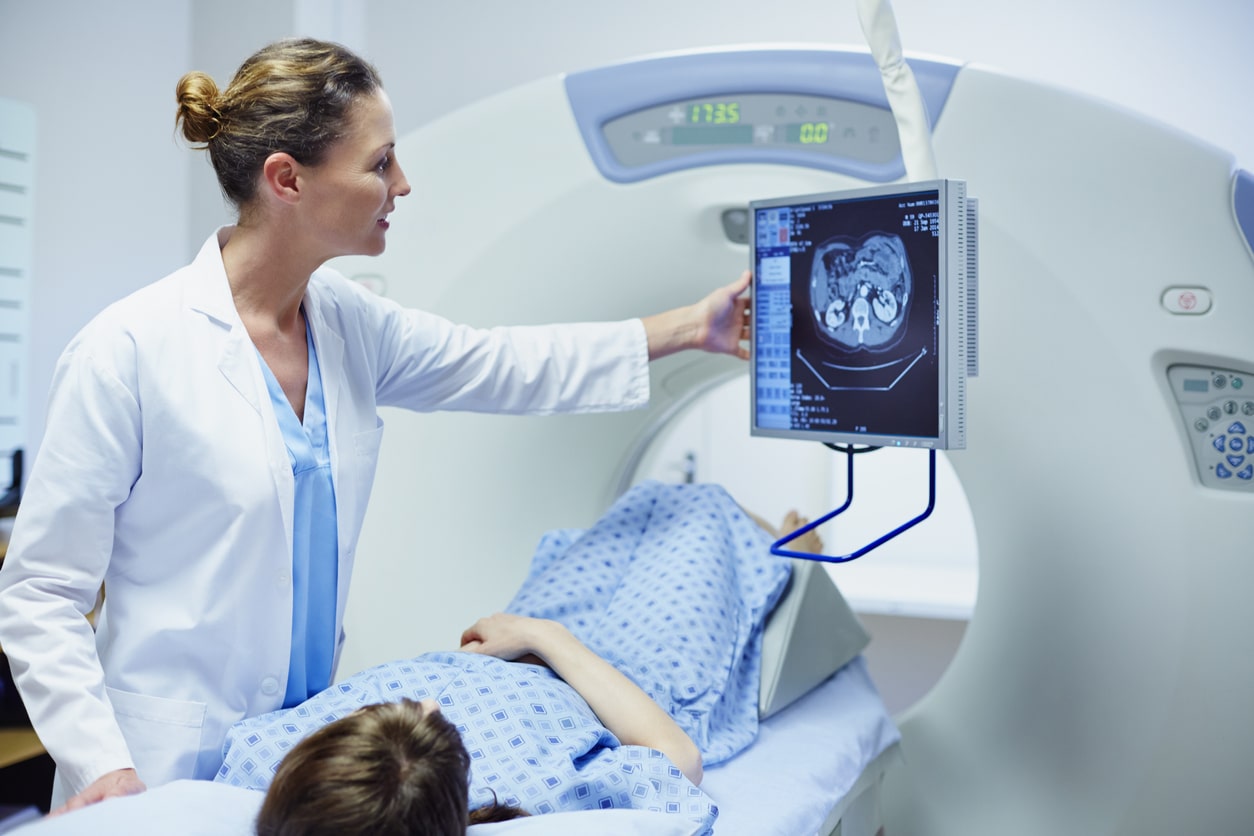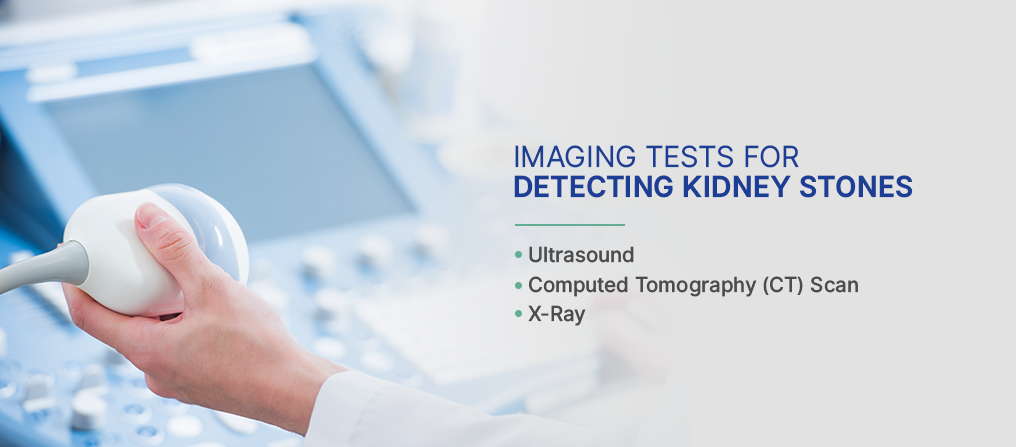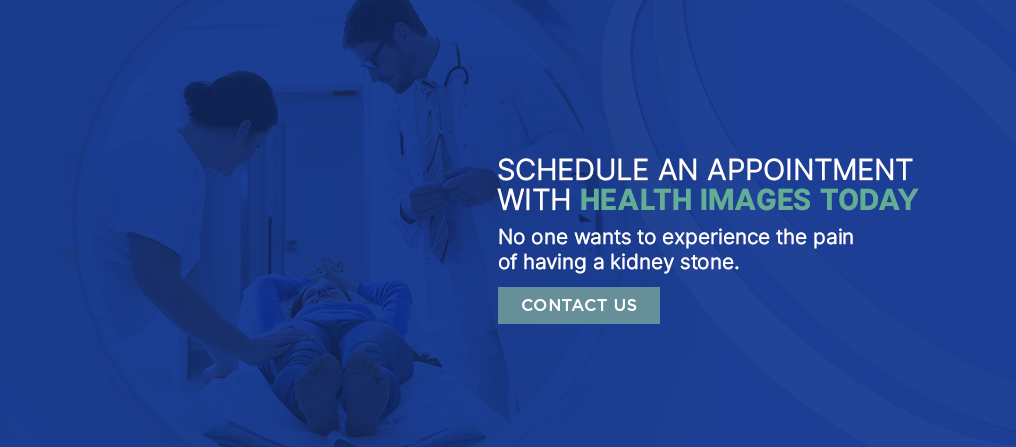Scans for Detecting Kidney Stones

Kidney stones are common and can occur at any age. According to the National Kidney Foundation, about one in 10 people will have a kidney stone in their lifetime. Sometimes kidney stones pass on their own and do not require medical attention. Other times, kidney stones can cause a lot of pain and warrant a doctor’s help.
If your doctor suspects kidney stones are causing the pain you’re experiencing, they may suggest a scan to locate the stone and determine the best treatment for your condition.
What Are Kidney Stones?
Each kidney is a bean-shaped organ that filters waste from your blood and produces urine. Kidney stones are solid pieces that develop in the kidneys and are made of salts and minerals.
Usually, the substances that cause kidney stones exit the body in the urine, but sometimes they stick together and form a solid mass. Kidney stones vary in size — they may be very tiny, like a grain of rice, or as big as a pearl. There are different types of kidney stones, too, composed of the following materials:
- Uric acid: Uric acid stones may form in the kidneys if you lose a lot of fluid due to factors such as heavy sweating or chronic diarrhea. These types of stones may also develop if you eat a high-protein diet or have diabetes.
- Calcium oxalate: According to the National Kidney Foundation, eight out of 10 kidney stones are calcium oxalate stones. If there is more oxalate than liquid in your urine, the material can crystallize and form stones. Oxalate is a natural substance found in many foods, such as almonds, spinach and chocolate. You don’t need to stop eating these foods to prevent kidney stones, but you should avoid excessive intake of high-oxalate foods.
- Struvite: Struvite is a mineral that may form due to chronic urinary tract infections. These types of stones can grow large quickly. Struvite stones are not very common.
- Cystine: Cystine stones form when there is too much cystine in the urine. Cystine is an amino acid. Cystine stones only account for 1% to 2% of all kidney stones.
Knowing the type of kidney stone you have can help you get the right treatment and prevent stones from forming again.
Symptoms of Kidney Stones
Small kidney stones can usually pass on their own. Larger stones can get stuck in the ureters, which leads to intense discomfort. Your ureters are the tubes that send urine from your kidneys to your bladder. When a stone gets stuck in a ureter, it blocks the flow of urine and causes severe pain. However, kidney stones can cause discomfort in different locations as they move through your urinary tract.
If a kidney stone blocks your urinary tract, you might need to see a doctor for help. You may experience the following symptoms:
- Feeling the need to urinate frequently
- Urinating in small amounts
- Painful urination
- Burning sensation when urinating
- Fever and chills
- Nausea and vomiting
- Sharp pain in the back and side below the ribs
- Blood in your urine
- Cloudy or odorous urine
Imaging Tests for Detecting Kidney Stones
Your doctor can diagnose kidney stones by examining your blood and urine. A blood test can show your doctor if there’s too much uric acid or calcium in your blood. A urine test lets your doctor see the level of minerals in your urine. It also shows a lack of certain substances in your urine to prevent kidney stones from forming. Both tests will tell your doctor if you have an infection.
Your doctor may also suggest an imaging test to confirm the presence of kidney stones. Here are common scans used to test and diagnose kidney stones:
1. Ultrasound for Kidney Stones
Your doctor might recommend an ultrasound for kidney stones because it is a quick, safe and easy procedure. An ultrasound uses sound waves to create images and does not involve radiation.
During an ultrasound, you’ll lie on an exam table while a technologist moves a transducer over the part of the body being scanned. A transducer is a handheld device that sends and receives sound waves. The sound waves will then be processed by a computer to produce images.
An ultrasound may provide enough evidence for a kidney stone diagnosis. However, if the images are not clear, your doctor might order a computer tomography (CT) scan.
2. Computed Tomography (CT) Scan for Kidney Stones
A CT scan for kidney stones can detect tiny pieces that other imaging tests might miss. Doctors may choose a CT scan in an emergency because it allows them to make a quick decision. A CT scan uses x-ray beams to capture images from different angles. A computer processes the information and produces three-dimensional pictures of the area scanned.
During a CT scan, you’ll lie on an exam table that enters a tube-like scanning machine. A scanner will rotate around your body and send x-rays to the part being studied. The x-ray data is then sent to a computer and processed.
Your doctor can look for kidney stones as they examine the CT scan images. They can also look for kidney tumors, lesions or other conditions.
3. X-Ray for Kidney Stones
X-rays are used less frequently than CT scans because they can miss small kidney stones. However, your doctor might recommend an x-ray first to look for large kidney stones or the presence of many stones.
During an x-ray for kidney stones, you will either lie on a table or stand. The technologist will place the x-ray machine near your abdomen and ask you to hold your breath while the x-rays pass through your body. You will be asked to stay still, so the machine produces a clearer image. The technologist may need you to change positions so they can get all the necessary images.
Schedule an Appointment With Health Images Today
No one wants to experience the pain of having a kidney stone. Fortunately, doctors have the diagnostic tools necessary to quickly identify kidney stones and help you feel better fast.
If you need an imaging test for kidney stones and live in the Denver area, we’re ready to help you at Health Images. We are committed to creating a comfortable, positive experience for our patients. Our technologists use the latest CT scan, x-ray and ultrasound technology to produce clear, accurate images. If you need a scan for kidney stones, schedule an appointment at Health Images today.
Call To Schedule Your Appointment
Sources:
- https://medlineplus.gov/kidneystones.html
- https://www.mayoclinic.org/diseases-conditions/kidney-stones/symptoms-causes/syc-20355755
- https://www.kidney.org/atoz/content/kidneystones_prevent
- https://www.kidney.org/atoz/content/what-are-oxalate-kidney-stones
- https://www.ncbi.nlm.nih.gov/books/NBK470527/
- https://my.clevelandclinic.org/health/diseases/15604-kidney-stones
- https://www.mayoclinic.org/diseases-conditions/kidney-stones/diagnosis-treatment/drc-20355759
- https://medlineplus.gov/ency/article/000346.htm
- https://www.kidney.org/atoz/content/kidneystones
- https://www.healthimages.com/services/ultrasound-sonogram/
- https://www.cancer.gov/publications/dictionaries/cancer-terms/def/ultrasound-transducer
- https://www.ncbi.nlm.nih.gov/books/NBK379839/
- https://www.healthimages.com/services/ct-scans/
- https://www.hopkinsmedicine.org/health/treatment-tests-and-therapies/ct-scan-of-the-kidney
- https://www.healthimages.com/services/x-ray/
- https://www.webmd.com/kidney-stones/do-i-have-kidney-stones#1
- https://www.uwhealth.org/urology/kidney-stone-diagnosis/11229#:~:text=KUB%20(Kidney%2C%20ureters%2C%20bladder,the%20progress%20of%20the%20stones.
- https://www.niddk.nih.gov/health-information/urologic-diseases/kidney-stones/diagnosis
- https://www.hopkinsmedicine.org/health/treatment-tests-and-therapies/kidney-ureter-and-bladder-xray
- https://www.healthimages.com/about-us/why-choose-us/
- https://www.healthimages.com/locations/
- https://www.urologyhealth.org/urologic-conditions/kidney-stones





